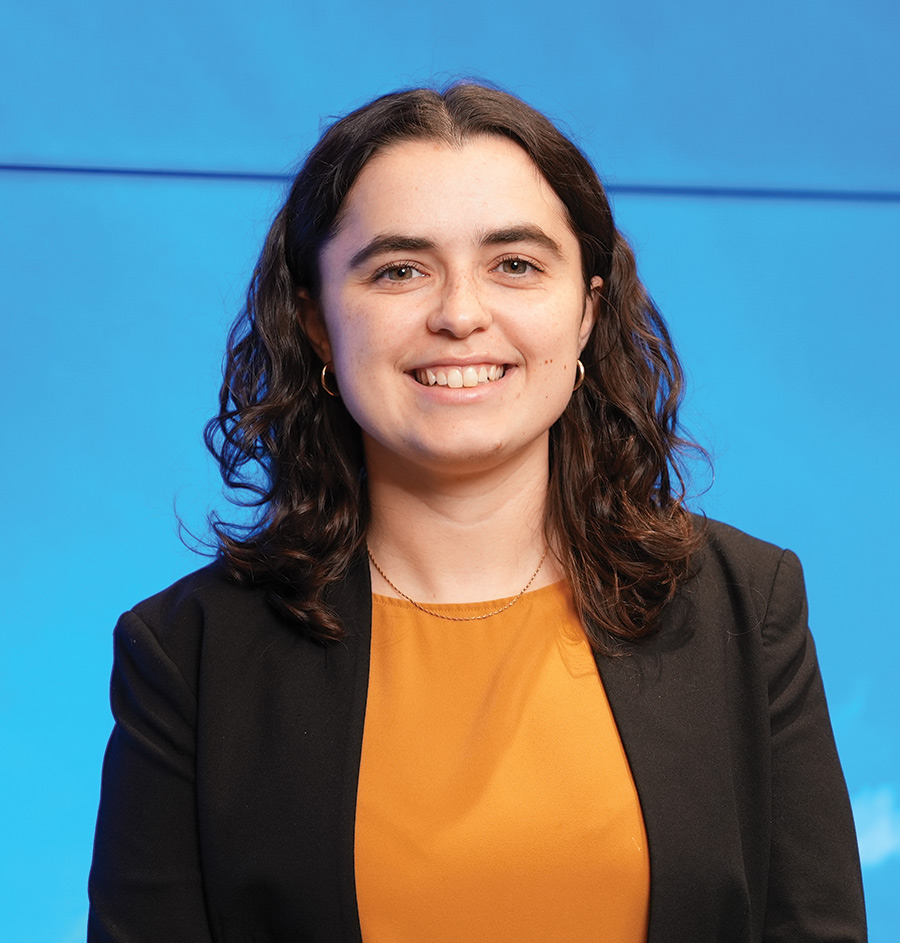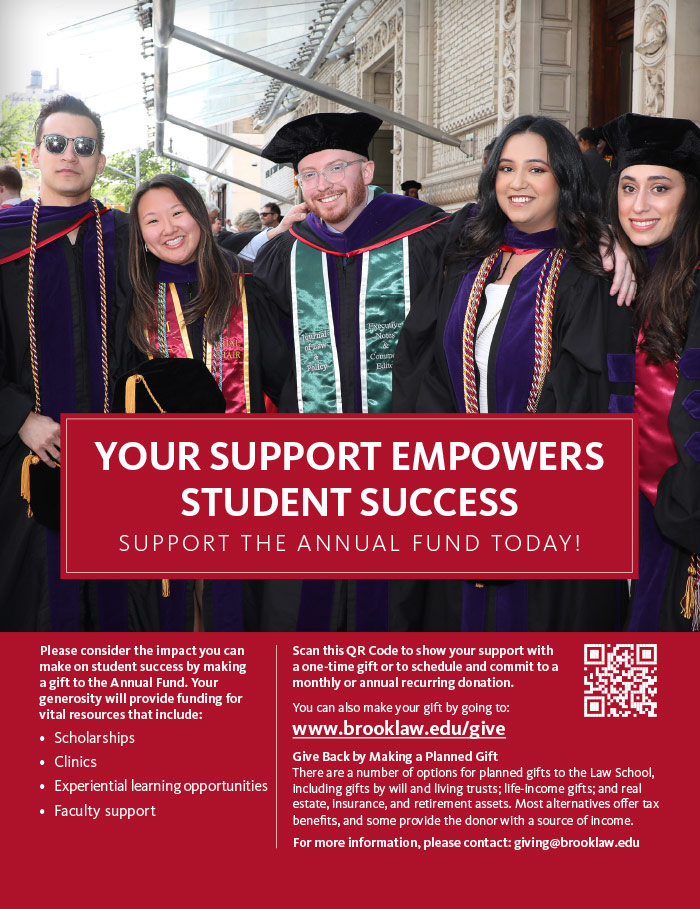
Dean’s Message
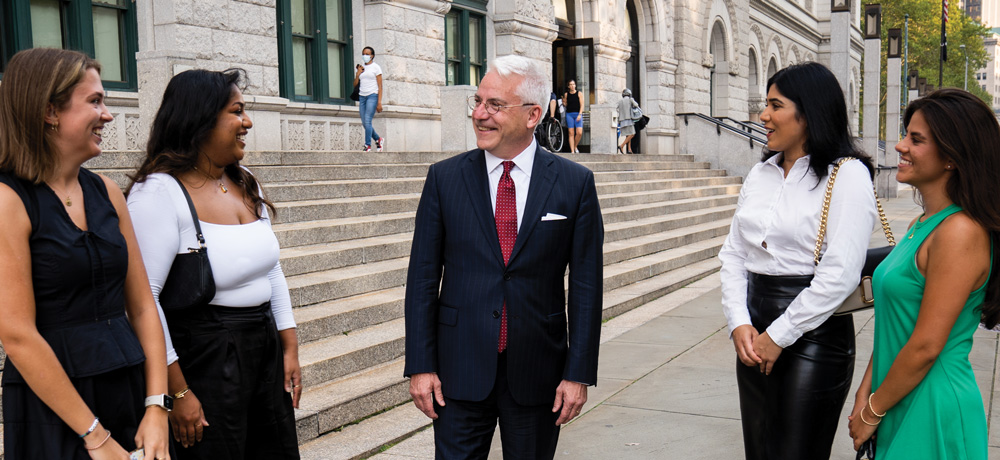
HERE ARE MANY ASSETS that set Brooklyn Law School apart and that make me excited for its future. There is our dynamic faculty, as ambitious and impactful as any in the country. There is our leadership in clinics and practical legal training, for which we recently ranked 12TH in the country. And, of course, there is the Law School’s location, in the heart of the world’s most important, vibrant, and creative city.
But Brooklyn Law School has no greater asset than its proud and distinctive mission of access. Nearly 125 years ago, when the broader society was rife with racism, xenophobia, sexism, and religious persecution, this institution was founded as a haven where talented students from all backgrounds, origins, and faiths could excel and prepare themselves for leadership that would transform their families and their communities. At a time when most law schools were highly exclusionary, the Law School’s first classes were composed mostly of recent immigrants, including Muslims from Syria; Jews from Eastern Europe; Catholics from Cuba, Ireland, and Southern Europe; and African Americans and women.
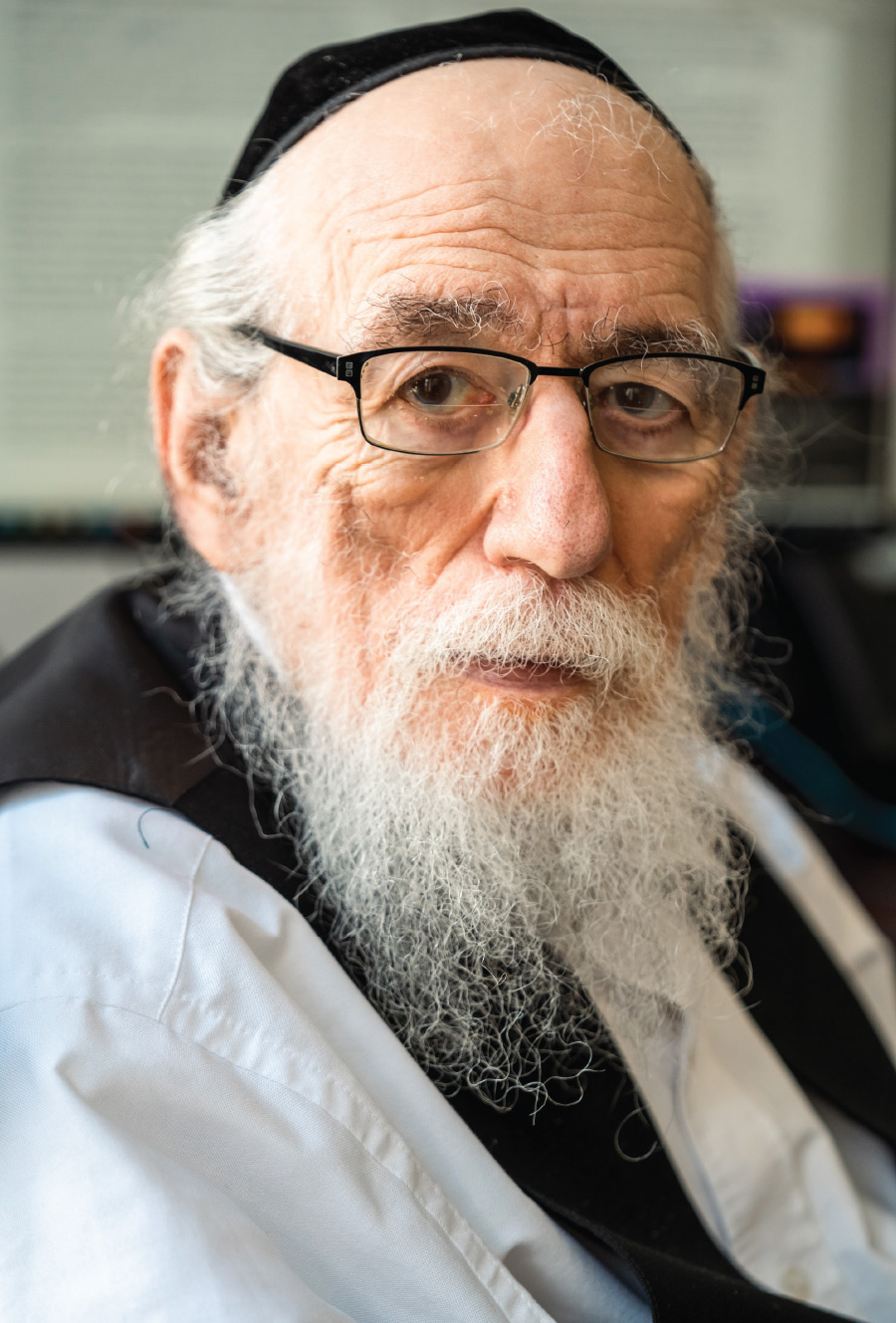
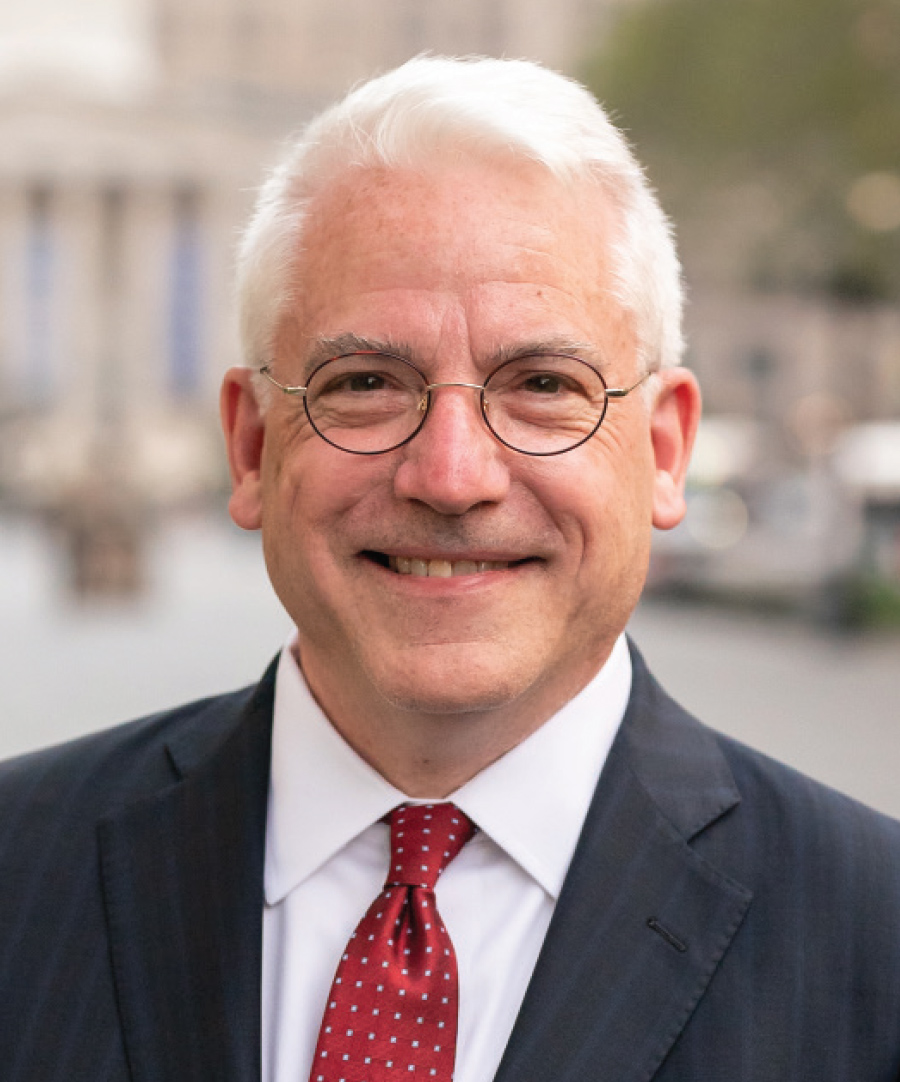
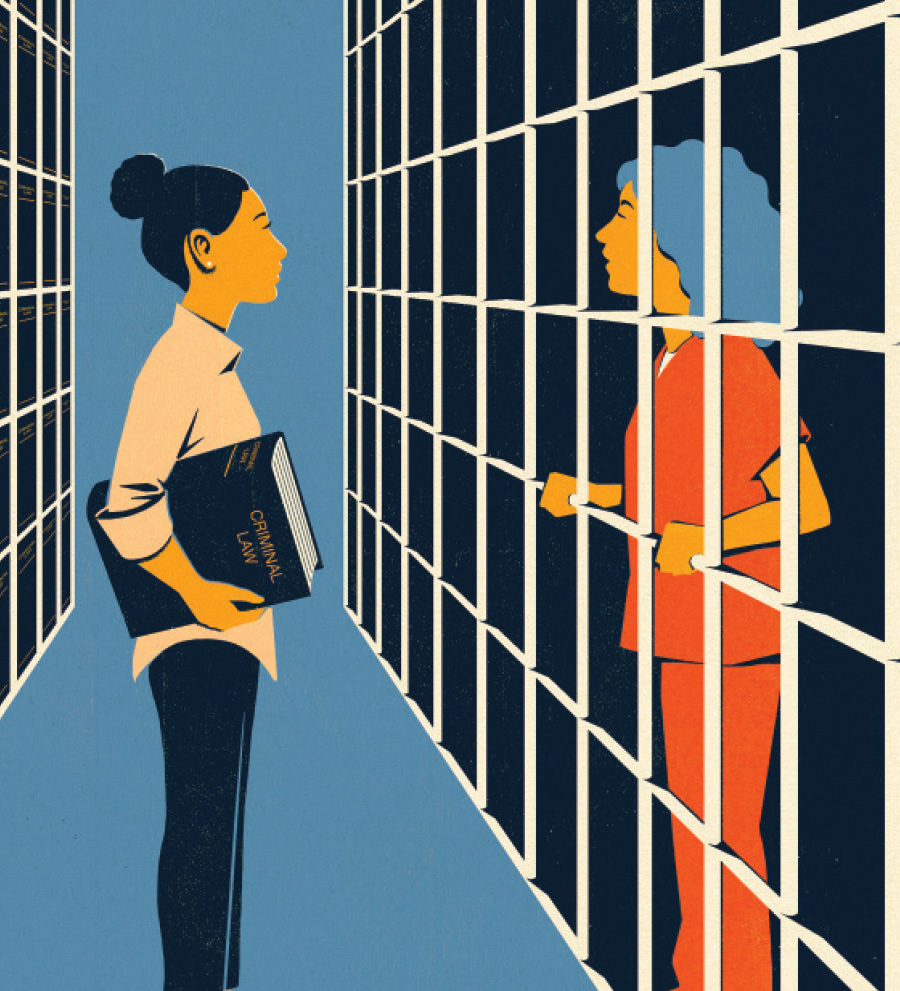
Plus: Clinic updates and other campus happenings.
Senior Director of Marketing and Communications
Amy Schraub
Suzi Morales
Julia Rafferty
Cherie Van Putten
Todd France
Tracy Moore
Will O’Hare
Conor Sullivan

Brooklyn Law School
250 Joralemon St.
Brooklyn, NY 11201

Welcome to a Promising Incoming Class

—Willis Huynh ’26
Some had previously worked in the legal field, like Shivani Parshad ’26, who spent three years as a paralegal for the U.S. Attorney’s Office, Eastern District of New York. A native of Baltimore, she earned degrees in political science and international relations from Boston University before arriving in New York City. Parshad expressed excitement about starting her law school journey, especially after hearing positive remarks from numerous alumni.
“Several attorneys I worked with attended Brooklyn Law School, and they all spoke highly of their experience,” Parshad said. “Learning from these alums solidified my decision. They emphasized the opportunities for public interest work here, which made it seem like the perfect fit for me.”
Another entering student was Willis Huynh ’26, a native New Yorker who discovered a strong connection between his military service and the legal field while attending the United States Military Academy at West Point, N.Y. During his time at West Point, Huynh played Division I golf, honed his leadership skills, and developed a desire to represent those in need.
Class of 2023 Celebrates Commencement Day at BAM
After gathering on May 16 at the elegant Peter Jay Sharp Building at the Brooklyn Academy of Music, 379 Brooklyn Law School students received their J.D. degrees and 11 were presented their LL.M. degrees on a stage bedecked with vibrant flowers, as friends, family, peers, and the entire school community cheered them on. Chairman of the Board of Trustees Frank Aquila ’83 presented an honorary Juris Doctor Honoris Causa degree to New York Attorney General Hon. Letitia “Tish” James, who gave a fiery commencement address, urging graduates to use their legal skills to fight for freedom, progress, and unity. Other featured speakers included Valedictorian Hayley A. Bork ’23 and Matthew Lign Fulton ’23, who was elected student speaker.
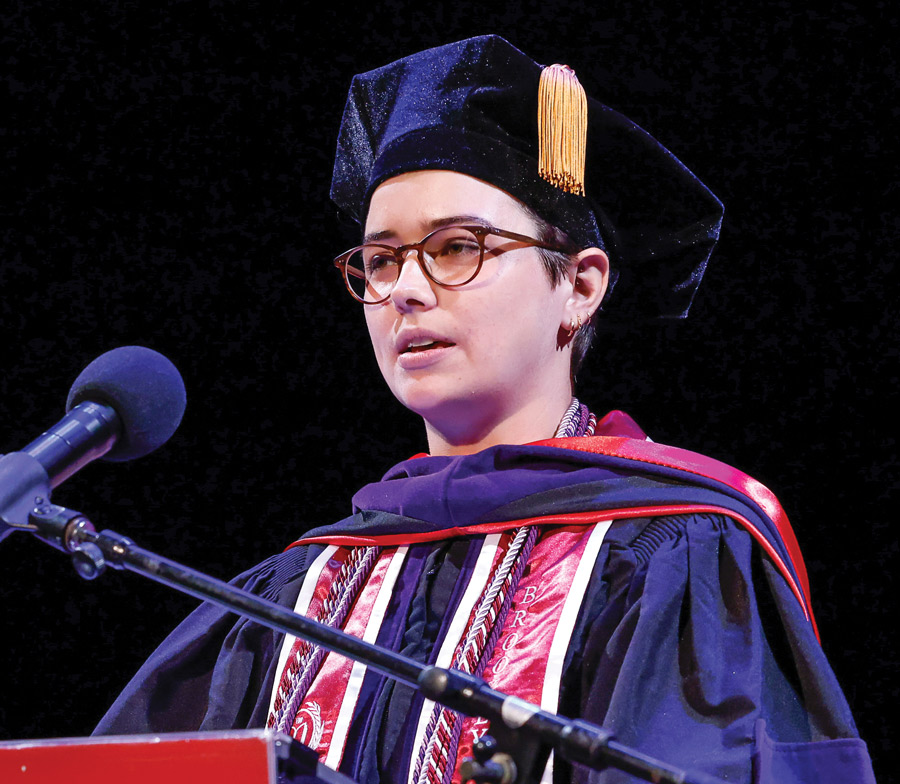
(Above)
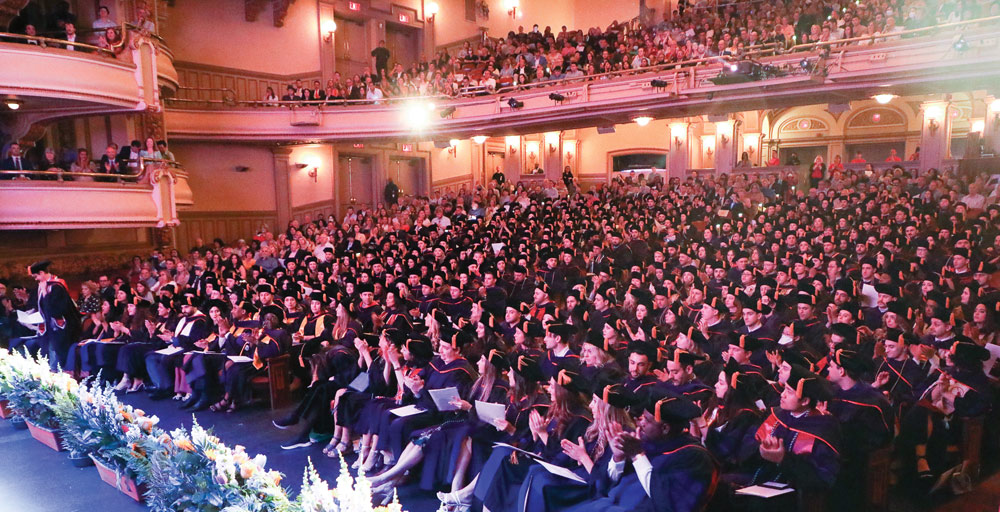
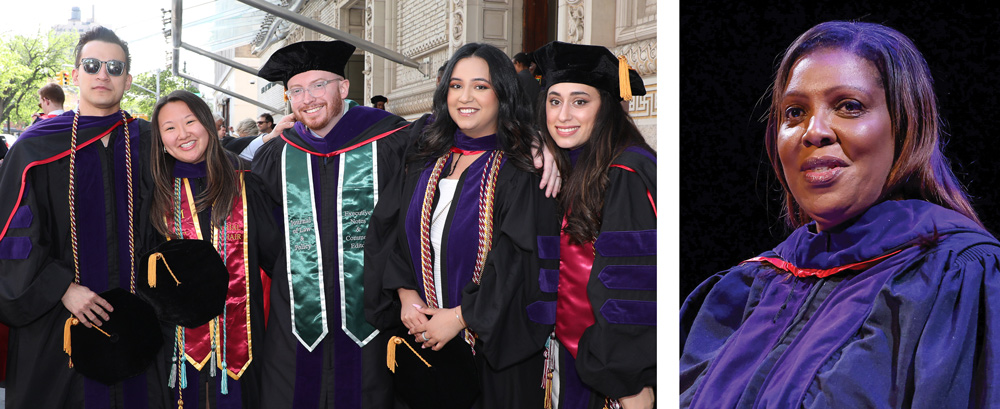
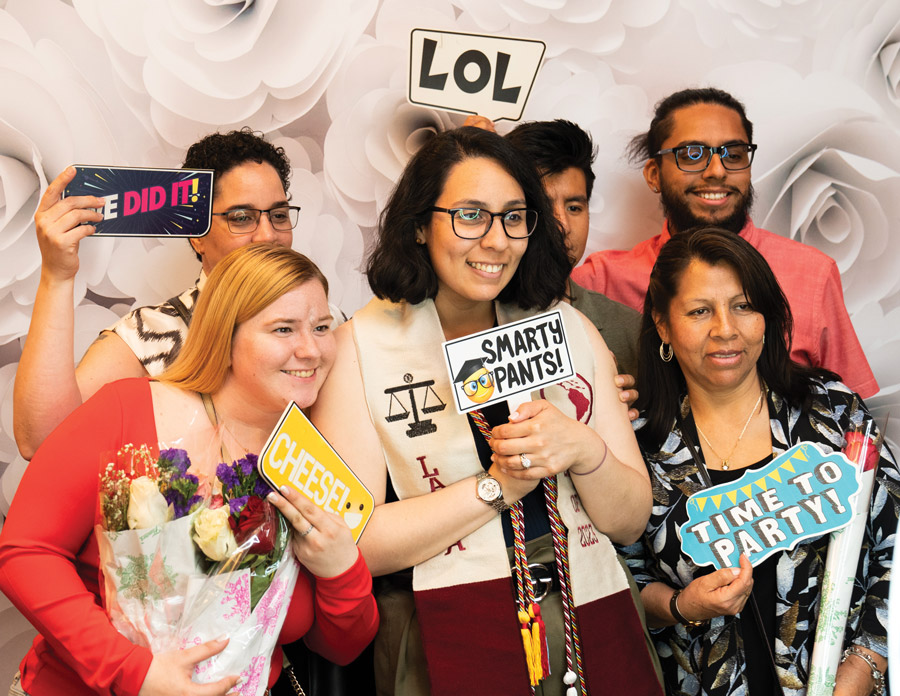
(above)
New Associate Dean Roles Keep Students in Focus

One new appointment marks an exciting transition for Associate Dean Karen Porter, who has been the inaugural Arthur Pinto & Stephen Bohlen Associate Dean of Inclusion & Diversity since January 2020. Porter is now the Associate Dean for Academic and Student Success, a new role that focuses on supporting students and leading schoolwide efforts to guide students through their law school experience. Although academic success is not a new focus for Brooklyn Law School, this is the first time an associate dean has been dedicated to the effort.
“We want to have the success of our students at the center of everything we do,” Porter said. “It’s not just academic success in the sense of what and how students are doing in the classroom, but really a more holistic approach to student success that includes broader aspects of what it means to succeed in law school and in the profession. Over the course of their studies, students often change their goals and adjust their expectations about what it means to carve out a space for themselves in the legal profession. And that can be really challenging, particularly for first-generation students who might not have a clear idea of what a career path looks like.”
Brittany Persson ’07 on AI’s Impact on Research, Her First Year as Library Director
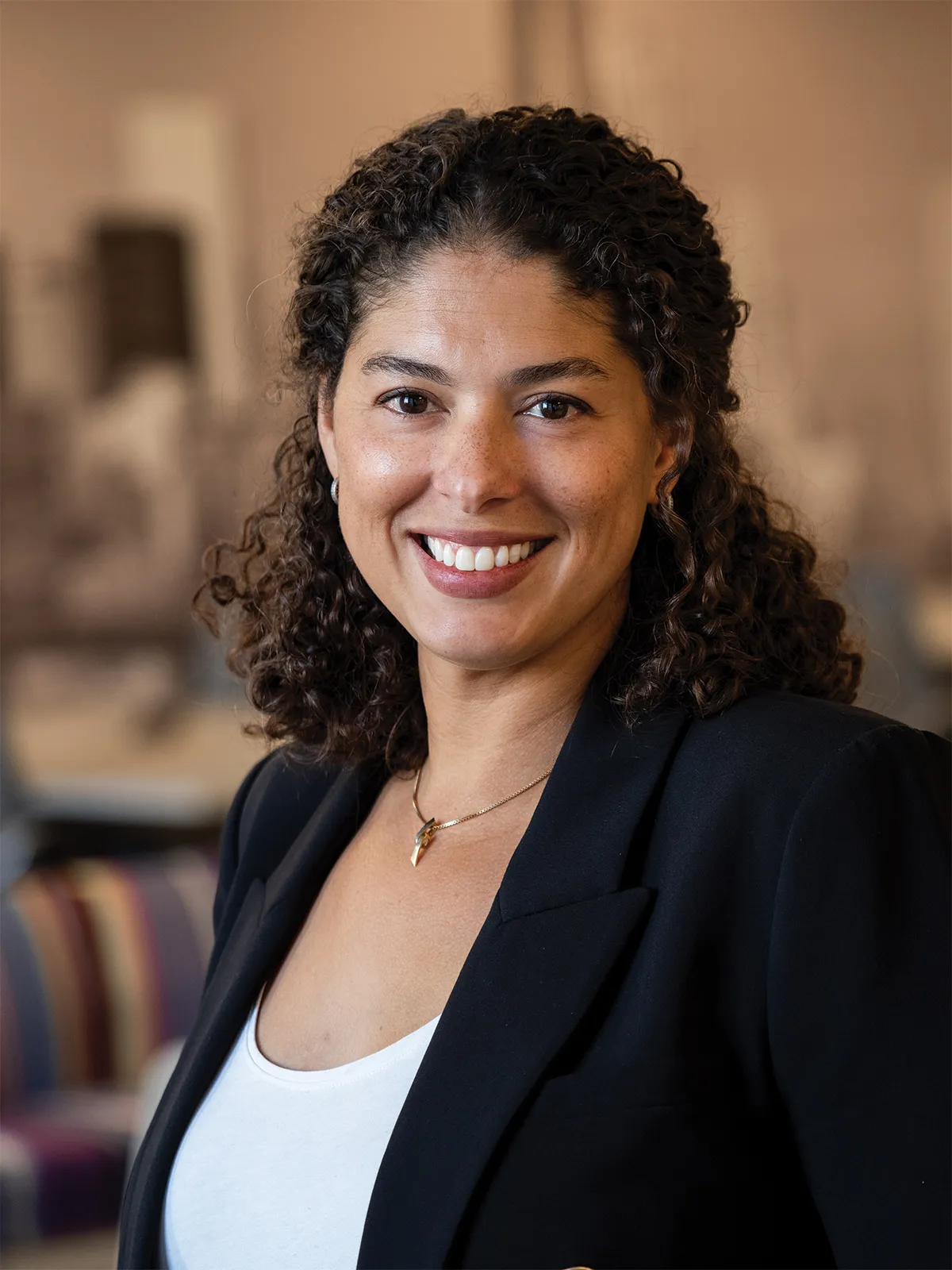
Library Director
Brittany Persson ’07
For Brittany Persson ’07, walking into the Brooklyn Law School Library as its new director, 15 years after she had graduated, was a heady experience.
“As a student, I was one of the first people in the library in the morning, and one of the last out in the evening,” Persson said. She recalls her favorite study haunts—a nook in the lower level of the library, and the second table on the left in the Professor Joseph Crea Reading Room—and remembers leaving the quiet spaces to converse with other students near the elevators, something students continue to do today.
Since she assumed her official role as library director and assistant professor of law on July 1, 2022, some things have changed. These include legal research instruction taught by law librarians, which not only focuses on legal research but also integrates emerging technologies and their impact on how legal research is conducted. Artificial intelligence (AI) is one of those newer technologies.
“We’ve always incorporated information literacy into our research instruction. AI and algorithms have been a part of all the databases that we have been teaching on, which means that as AI has evolved, we have adapted our information literacy instruction to reflect those changes,” Persson said.
Dean’s Research Scholars and New Directors Appointed
Codrington, a constitutional law scholar with a focus on constitutional reform, election law, and voting rights, co-authored The People’s Constitution: 200 Years, 27 Amendments, and the Promise of a More Perfect Union.
Hoag-Fordjour teaches and writes in the areas of criminal law and procedure, evidence, and abolition, and co-directs the Center for Criminal Justice. Her scholarship interrogates the policies, doctrines, and practices within the criminal legal system that erode constitutional rights and perpetuate racial subordination.
Brooklyn Law School alumna Diane Penneys Edelman ’83 has been named permanent director of the international program after serving as a visiting director in spring 2023. In addition to coordinating all aspects of international programs for LL.M. and J.D. students, Edelman is an adjunct professor of law.
Professor Prianka Nair, an assistant professor of clinical law who was co-director of the Disability and Civil Rights Clinic, is now full director of the clinic.
Professors of Legal Writing Heidi Gilchrist and Maria Termini are now co-directors of legal research and writing. Gilchrist’s scholarship focuses on national security law issues, and Termini’s focus is on legal education pedagogy.
Criminal Defense and Advocacy Clinic Advocates for Incarcerated Survivors

Led this past academic year by Professor Kate Mogulescu and Visiting Assistant Professor Elizabeth Isaacs, the clinic had 16 student participants, including eight new students and eight who returned for the advanced clinic. The clinic’s focus has been investigating, drafting, and litigating resentencing motions under the Domestic Violence Survivors Justice Act (DVSJA), a groundbreaking New York law passed in 2019 that allows for post-conviction sentencing reductions. Other clinic projects include clemency petitions, parole advocacy, and reinvestigation of claims of actual innocence. Over the 2022–23 academic year, CDAC students visited numerous people in prison, also building relationships with survivors serving extreme sentences.
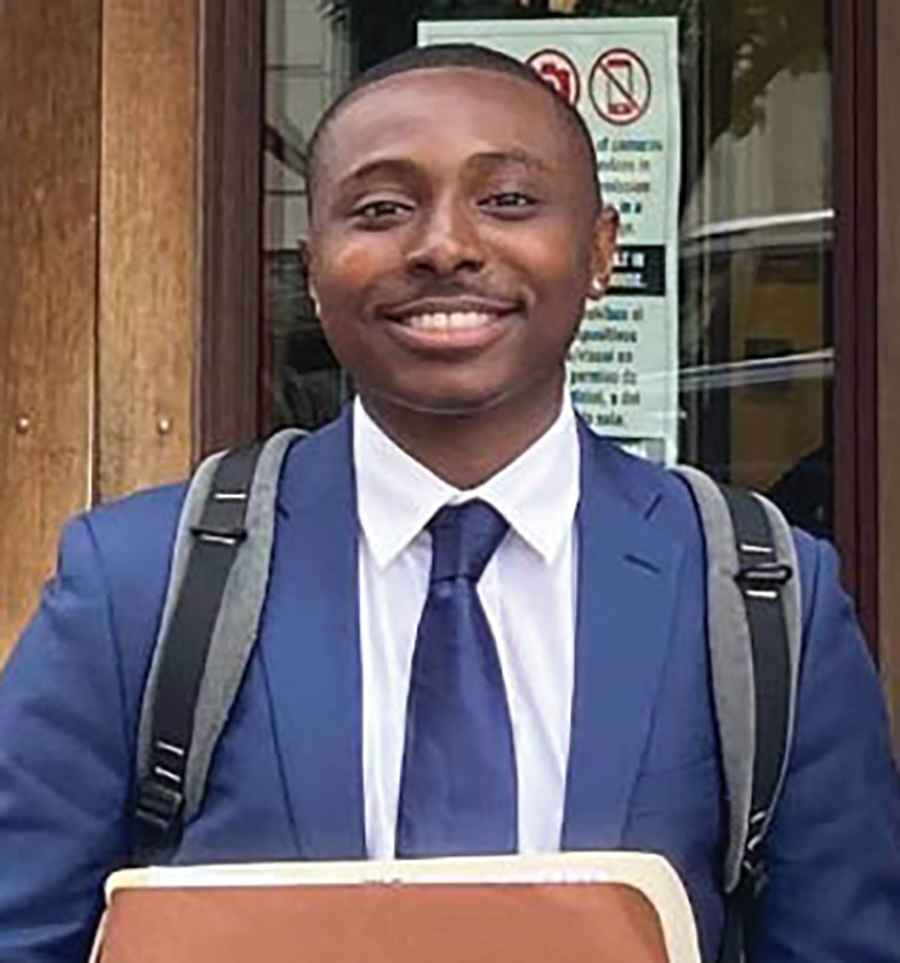
Most recently, on Aug. 4, Rahmel Lee Robinson ’24 won resentencing in Albany County Court for an incarcerated survivor with help from Mogulescu and recent graduates Gregory Chang ’23 and Taylor Ramirez ’23. Resentencing subtracted nearly a decade from her earliest possible release and eliminated a potential life sentence.
Earlier in the year, CDAC welcomed home another survivor who had been incarcerated for 11 years after successfully gaining a significant sentence reduction on a manslaughter conviction in the Bronx. The client was the first person in New York State resentenced under the DVSJA whose case involved intimate partner violence between gay male partners. The resentencing reclaimed over nine additional years of incarceration. Multiple student teams worked on this case under the supervision of Mogulescu and Isaacs, and those instrumental in its outcome included Katie Anderson ’23, Paige Massaker ’23, Elizabeth Feinberg ’22, and Rebekah Otis ’22.
BLIP Goes to SCOTUS in Artificial Intelligence Case
This spring, Professor Jonathan Askin and his students in the Brooklyn Law Incubator and Policy (BLIP) clinic and a group of Chicago-based patent lawyers filed an amicus brief supporting computer scientist Stephen Thaler, the founder of Imagination Engines, an advanced artificial neural network technology firm. Thaler argued that his Device for the Autonomous Bootstrapping of Unified Sentience (DABUS) system created unique prototypes for a beverage holder and emergency light beacon entirely on its own and should be granted a patent.
The U.S. Patent and Trademark Office and a federal judge in Virginia rejected his patent applications on the grounds that DABUS is not a person. The U.S. Court of Appeals for the Federal Circuit upheld those decisions last year, asserting that U.S. patent law unambiguously requires inventors to be human beings.
In the brief, Askin and the clinic students argued that the U.S. Supreme Court should take up a review of the U.S. Patent and Trademark Office’s refusal to issue patents to inventions developed by AI programs. “We argue that the U.S. needs a clear policy on how to use AI as a vehicle for invention and innovation,” Askin said. “Without such clarity, the U.S. will take a back seat to countries with clear rules on AI’s use in inventorship.”
The brief claimed that the federal circuit court’s decision “may have a chilling effect on innovation and scientific discovery.” Unfortunately, the Court denied certiorari in the case in April.
New School Year Begins with Flurry of Activities


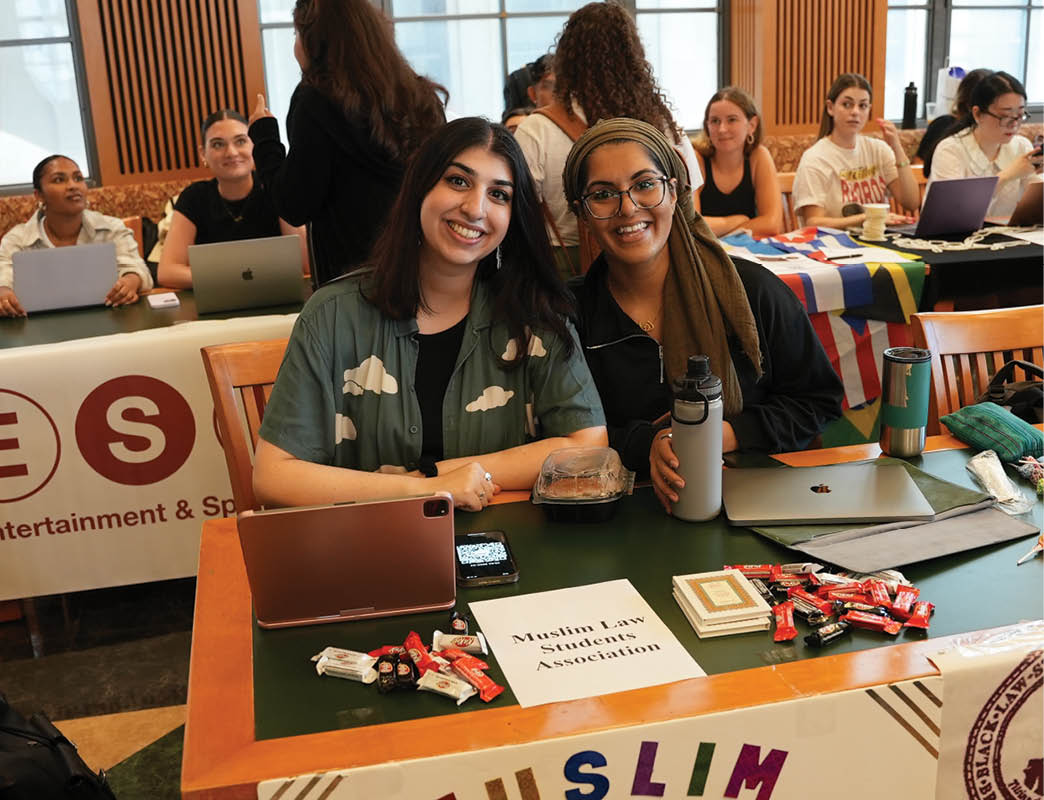
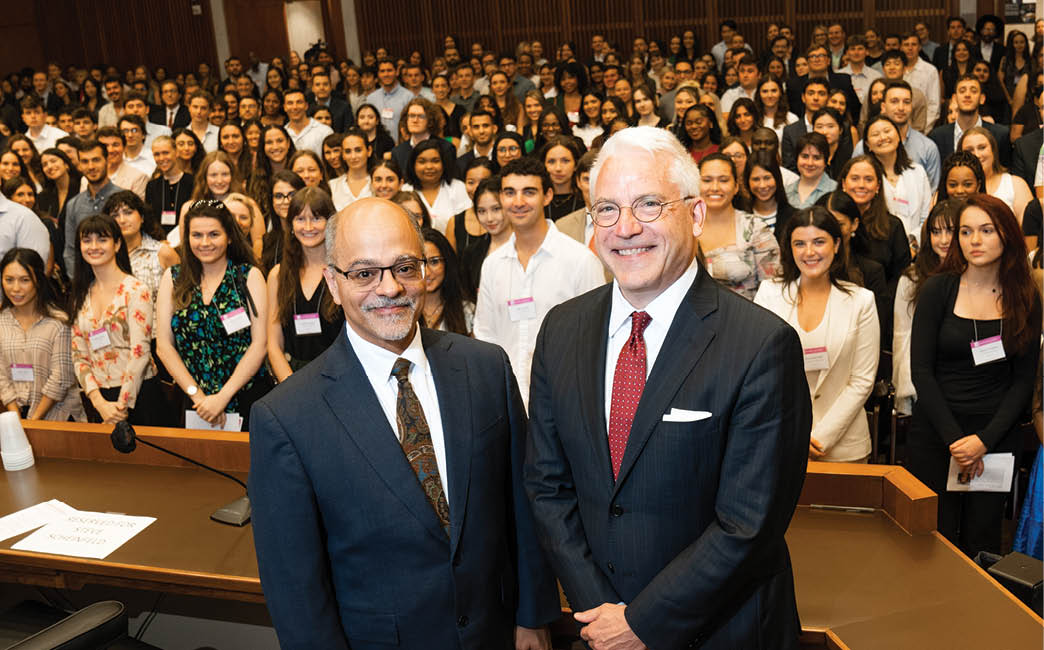
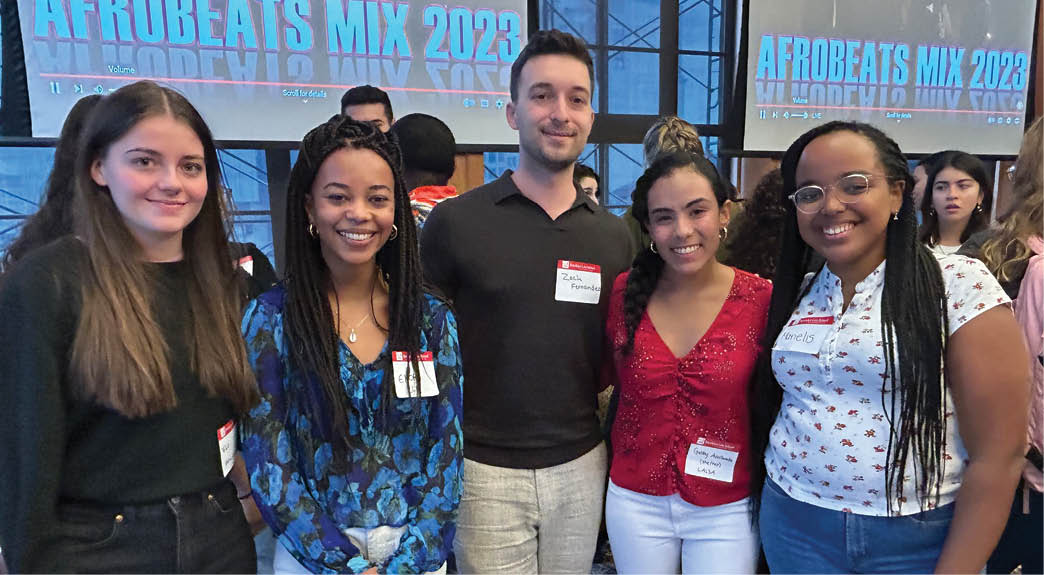
Forerunners
Now, nearly half of U.S. states, including New York, have legalized recreational cannabis, and it is a signature scent on the streets of New York City. Most people have at least heard of blockchain; other fintech platforms, such as mobile payment or investment apps, are common. Seemingly everyone is using platforms like ChatGPT for fun, or to streamline their work.
What unites these three disparate industries is that they are each just hitting what some call “the Overton window,” a model for how societal ideas evolve over time.
“The Overton window is a concept that says until there is critical mass, nothing happens on an issue, but all of a sudden the popular zeitgeist has a dramatic shift, and practices and policies that seemed untenable become completely viable,” said Professor Jonathan Askin, the founder and director of the Brooklyn Law Incubator & Policy (BLIP) Clinic and the innovation catalyst for the Center for Urban Business Entrepreneurship (CUBE). According to Askin, “like gay marriage circa 2012, cannabis legalization is now hitting the Overton window and its inevitability.”
Each industry has legal issues that need to be addressed. With cannabis, legalization in numerous states has prompted a reexamination of federal laws that currently classify cannabis as a tightly regulated Schedule 1 controlled substance, on par with heroin. In fintech, there’s a growing need for lawyers to intercede between technologists who “run roughshod” over the rules, and conservative policymakers who want to crack down on financial technology, Askin said. Finally, for AI, the questions relate to privacy, copyright and invention, cybersecurity, authenticity, global competitiveness, and a slew of ethics issues.
Meet the Brooklyn Law School alumni who leapt into these cutting-edge areas well ahead of the pack.
Cultivating a Cannabis Law Practice
Joseph Bondy ’94
What drives him, though, is a desire to help others. Bondy often tells students in Cardozo School of Law’s annual Intensive Trial Advocacy Program, for which he is a faculty member, that it is crucial to find commonality with clients, as he did with Parnas, who was initially scoffed at but became a media hero for his role in the Donald Trump impeachment case.
“You’re dealing with people who are in pain or hurt and who are frequently on the fringe and have been put down and pushed and kept down,” Bondy said. “Being able to understand them and develop a trust relationship with your clients is the most important key to your success.”
Fintech Flightpath
Anna Ashurov ’12
But in many ways, Ashurov was the quintessential Brooklyn Law School student. Ambitious, intellectually curious, and hardworking, she jumped right into the Law School community. She was the 1L evening delegate to the Student Bar Association, an associate editor on the Brooklyn Journal of International Law, and a self-described “sponge,” taking in all the experiences and knowledge she could.
Today, she continues to defy labels, shape her own path, and enthusiastically take on new challenges.
Not-So-Artificial Intelligence
Jessica Lipson ’05
As a partner and co-chair of the Technology, Data & IP Department at Morrison Cohen in New York, Lipson advises an ever-increasing number of clients on the legal implications of AI. She has also written prolifically on the topic, including as a quarterly contributor for Reuters. Despite her cutting-edge practice focused on technology transactions, her career has been shaped by the old-fashioned relationship building that will always have a place in the practice of law.
Armed with an undergraduate degree in chemical engineering and a minor in environmental engineering, Lipson worked for several years as an engineer at Merck, and went to law school with an eye toward practicing environmental law. Brooklyn Law School offered her not only the flexibility to continue working during her legal studies, but also a pragmatic approach to training lawyers and a variety of clinics. She started as an evening student before transferring to the day program.
Taking the Lead
portrait by Todd France
portrait by Todd France

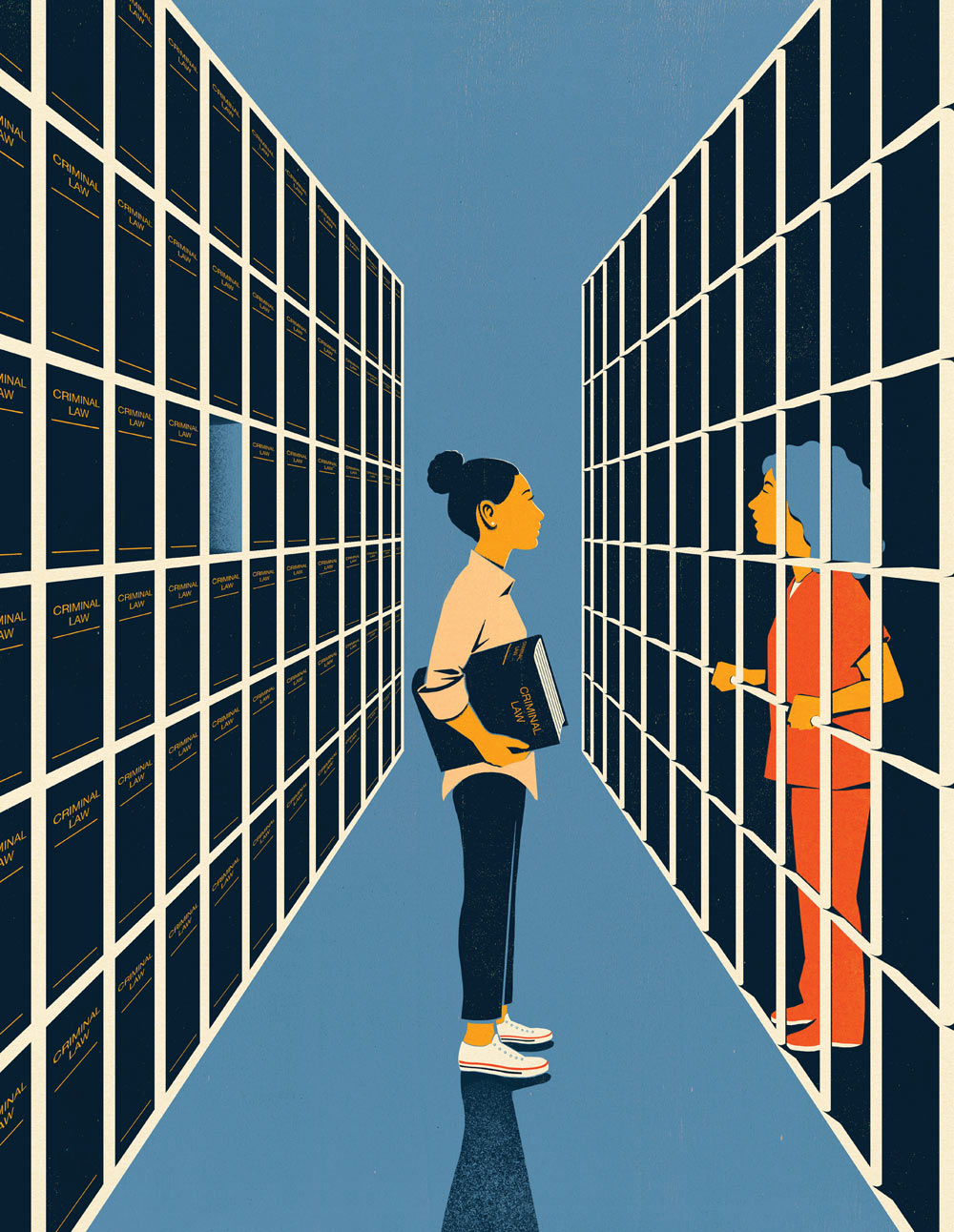
Rethinking Justice:
Not a Textbook Case
Illustration by Dan Bejar
ABOLITION AND THE REALITIES OF A LIFE SENTENCE
As a partner in Brooklyn Law School’s Rethinking Justice program, Smith works with student fellows to integrate stories like hers into the criminal law curriculum. In the spring of 2023, Professor Alexis Hoag-Fordjour’s Abolition class heard Smith describe how she spent 39 years in prison—longer than many of the students in the class had been alive. Her story was sorrowful, yet especially salient for a class focused on abolition, the movement to shrink carceral systems. A Brooklyn native, Smith grew up with a drug-addicted mother and ran away from home at 13. She spent part of her adolescence unhoused or in state-mandated placements for young people. At 17, Smith and a co-defendant robbed and killed an elderly couple.
Convicted of a double homicide, Smith was sentenced to 50 years to life in prison at Bedford Hills Correctional Facility for Women, meaning that her first opportunity for parole would occur when she was 67. However, in 2018, after her attorney, Ron Kuby, and Brooklyn District Attorney Eric Gonzalez facilitated an exchange of letters with the victim’s daughter, Smith obtained early release.
The
Faithful
Scholar
Portrait by Todd France
“My father came to Milwaukee from Russia in 1927,” said Twerski, the Irwin and Jill Cohen Professor of Law. “He had infinite love and compassion for people, and they were drawn to him. And so he built a community. My parents’ door was open to everyone from five o’clock in the morning till five o’clock the next morning… and the next. They had ancestors who were outstanding Jewish leaders in Russia and Poland, and they were raised to live for others. It motivated their lives. It was the air that we breathed.”
This spirit of community was the foundation not only for Twerski’s own deep faith and compassion but also for his strong commitment to the field of tort law, for which he has been a powerful voice as a respected lawyer, professor, and scholar for more than 50 years. His attraction to the field as a student was almost instantaneous, when he realized that the often quotidian matters that tort law addresses meant much more than they seemed to mean at first.
The
Consensus Builder
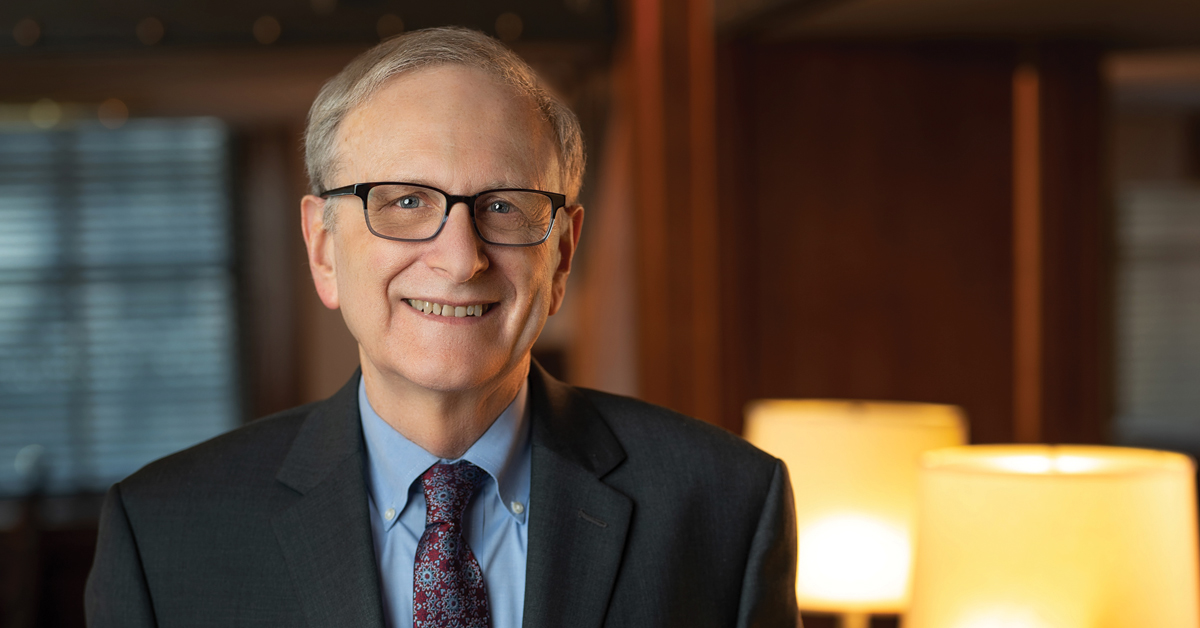
In May 2022, as Cohen retired from teaching after 37 years at Brooklyn Law School, he was named the Law School’s 1901 Distinguished Research Professor of Law. His peers gathered for a symposium held in his honor, titled Commercial Law Harmonization: Past as Prologue.* Cohen himself summed up the event’s focus: “After a half century of commercial law harmonization, both domestically and internationally, what have we learned and what should we do next?”
Faculty
New Faculty Members Bring Unique Thought Leadership to Our Community
The Law School extends a warm welcome to these new professors, whose talent as teachers and scholars will enhance the student experience and further enrich a highly esteemed intellectual community. Meet the professors, who officially joined the faculty on

“The thing that I find most intriguing about the privacy aspect of media law is its rapid change over the past few years,” Gajda said. “When I started teaching, the internet was relatively new, so it’s been interesting to watch media evolve, to see privacy sensibilities grow, and to study the law’s at-times dynamic response.”
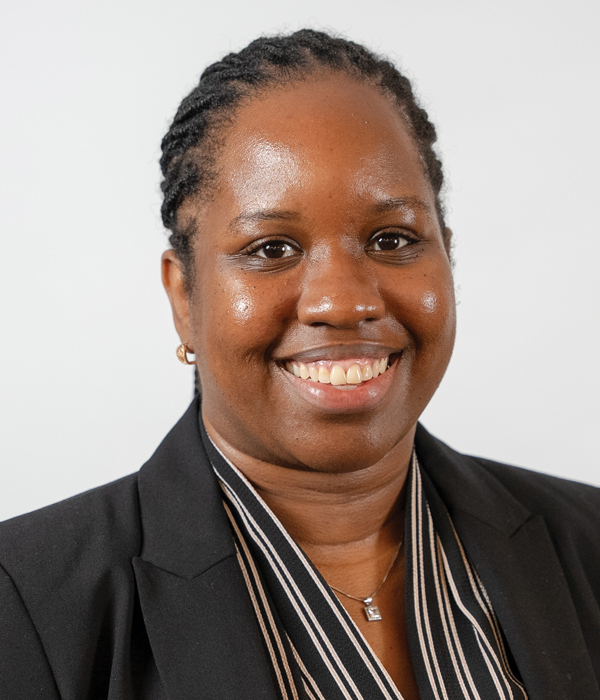
Brooklyn favorites: “One of my favorite activities is riding the New York City ferry. Being on the water is calming, and the rides provide easy access to different parts of Brooklyn.”
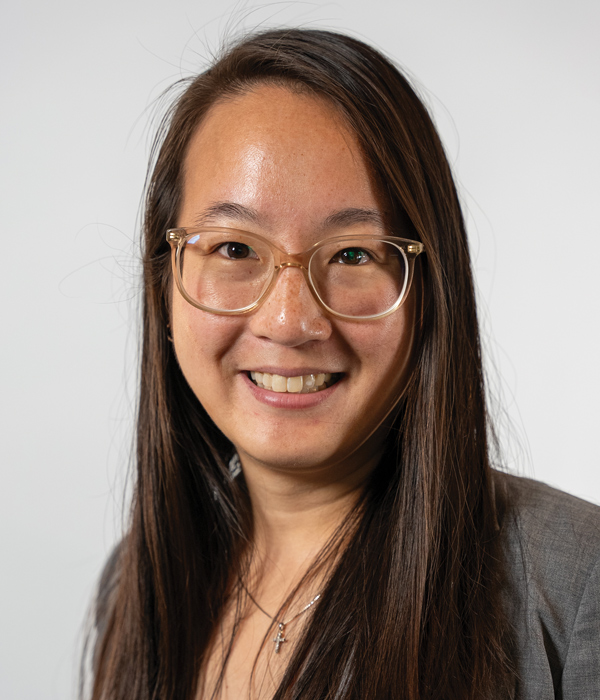
Brooklyn favorites: “I enjoy a Saturday morning run through Industry City and over to Bush Terminal Park, a hidden gem just down the hill from Sunset Park, where there are incredible views of the Statue of Liberty.”
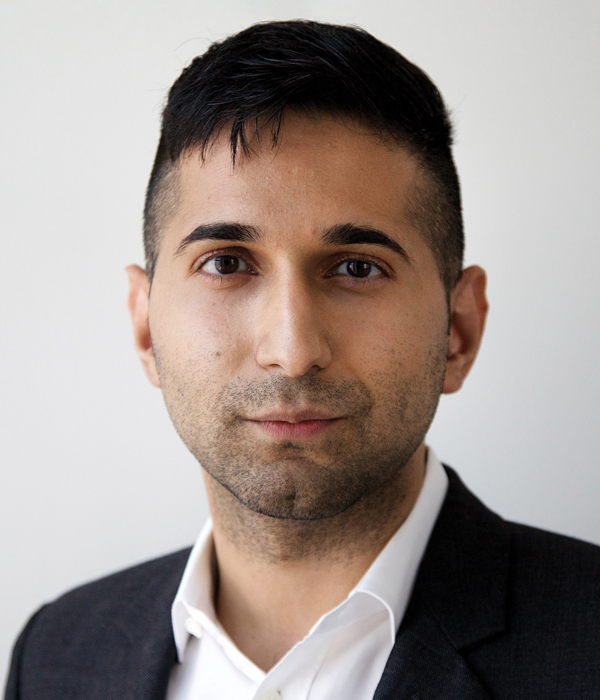
Brooklyn favorites: “I look forward to joining the incredible Brooklyn Law School community and returning to a neighborhood I lived in and loved while working with Human Rights Watch and Lambda Legal, from 2015 to 2021. Life is made better by proximity to family, friends, and Yemen Café!”
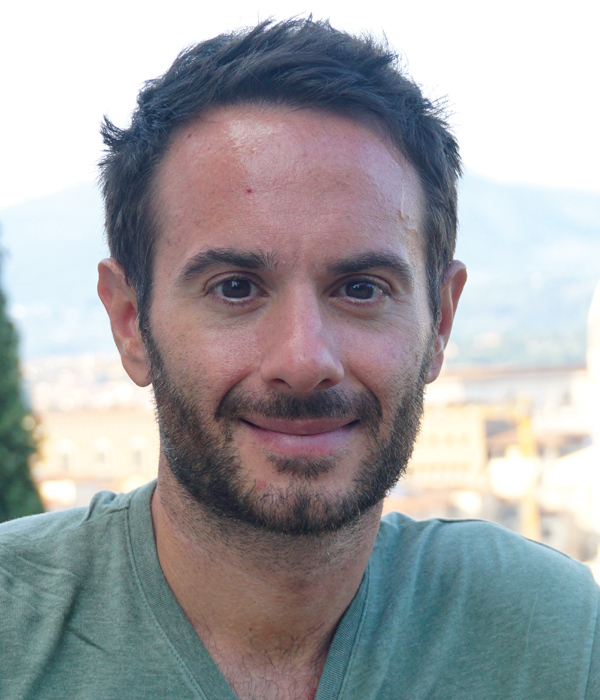
Brooklyn favorites: “Brooklyn was my home before the pandemic, and I’m so happy it will be my home again. I’m especially excited about getting back to Prospect Park, eating pizza at Sottocasa (best pizza in Brooklyn and only a short walk from the Law School!), and being close to my extended family in Connecticut.”
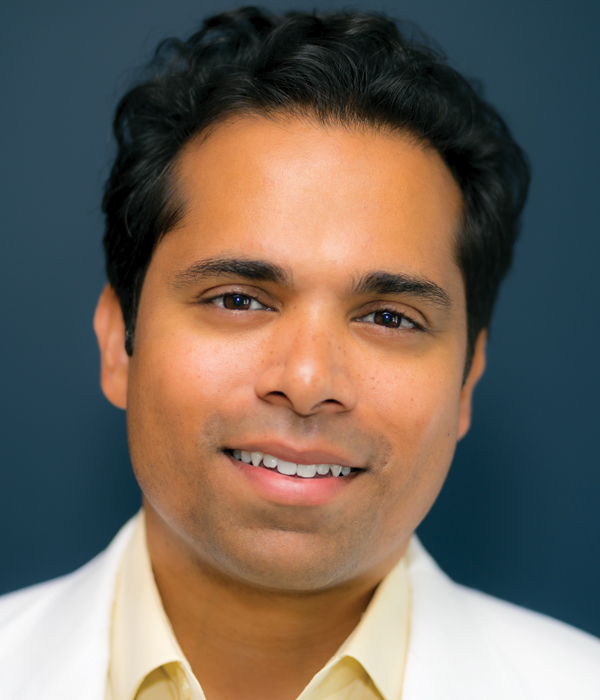
Brooklyn favorites: “Before moving to Brooklyn from Manhattan three years ago, I enjoyed crossing the river to explore the unique cultural institutions, public spaces, and restaurants integrated into this intricate network of communities. But since living here, I have come to appreciate Brooklyn even more for its engaging people.”
In the News


Faculty Scholarship
NEW IN FACULTY BOOKS
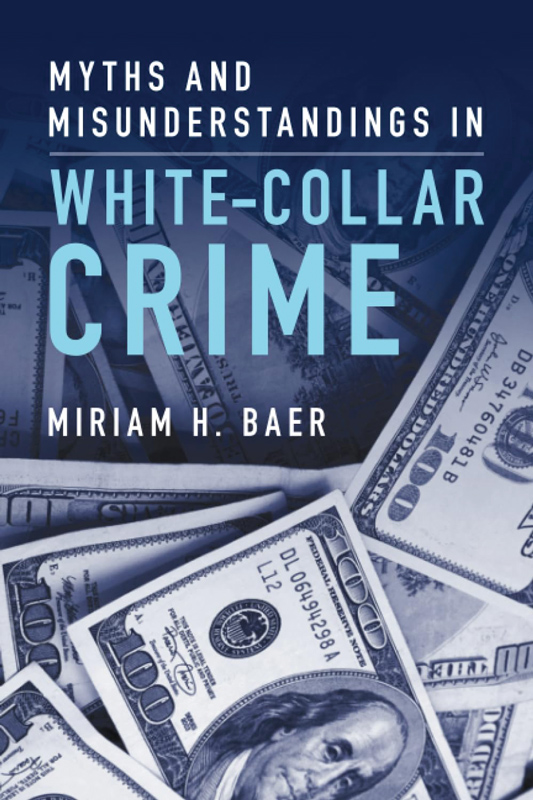
Myths and Misunderstandings in White-Collar Crime (Cambridge University Press, 2023)
USING REAL-WORLD EXAMPLES to explore the pathologies that hamper our ability to understand and redress white-collar crime, Baer’s book provides a step-by-step framework for reorienting the ways in which we prohibit, enforce, and discuss white-collar crime.
For-Profit Philanthropy: Elite Power and the Threat of Limited Liability Companies, Donor-Advised Funds, and Strategic Corporate Giving (Oxford University Press, 2023)
EXPOSING A MIGRATION of business practices, players, and norms into philanthropy, co-author Brakman Reiser explains how this shift strains the regulatory regime sustaining public trust in elite generosity through accountability and transparency, and how to restore that trust.
Alumni Events
Celebratory Alumni Dinner Reunites Classmates, Honors Esteemed Graduates
The March 15 gathering, held as a dinner rather than in the lunch format typical in previous years, inspired an overwhelming outpouring of support from alumni in more junior positions, especially those who found it easier to attend an evening event.
Alumni Association Board President Deborah Riegel ’93 led the program, welcoming the evening’s three honorees, including Alumnus of the Year Bernard Nash ’66, Distinguished Service honoree Debbie Epstein Henry ’94, and Rising Star honoree Aubria Ralph ’19.
Nash, who is co-chair of the nationally acclaimed State AG Group at Cozen O’Connor, credited colleagues, friends, and family for his success and the ability to give back to Brooklyn Law School.
Alumni Join in as Business Boot Camp Celebrates 10th Year of Mixing Instruction and Life Lessons
Business Boot Camp, which premiered 10 years ago and was held Jan. 9–12 this year, follows the life cycle of a fictional company as it grows from a family-owned pub into a publicly owned restaurant chain with an appetite for acquisitions.
Students learn how businesspeople work with lawyers as they deal with the growing pains, opportunities, and pitfalls encountered along the way. They learn about developing business plans, budgeting, financing, accounting, valuation, and cryptocurrency. They also work on softer skills, including networking, client development, and leadership. The course is based in part on training that Deloitte provides to new associates at law firms.
Alumni Impact
Family Increases Gift for Scholarship Named for Hon. Ralph Sansone ’79
Ralph Sansone was 32 when he died in a small-engine plane crash while returning home from a Memorial Day golf weekend in 1986. He left behind his son, Zach, who was just 3 months old, and his wife, Eva. His parents, Mary and Zach Sansone, formed the Ralph J. Sansone Foundation and created the endowed Ralph J. Sansone Scholarship Fund at the school in 2006. Now, thanks to a generous foundation gift of more than $300,000, the amount of each of the scholarship awards will increase dramatically and the scholarship will be awarded to two students every year rather than just one.
“From my perspective, investing in the youth of our society is a way to give back to the community while keeping my father’s memory alive,” said Zach Sansone, who joined the foundation board alongside his father’s former classmate Sal Aspromonte ’79.
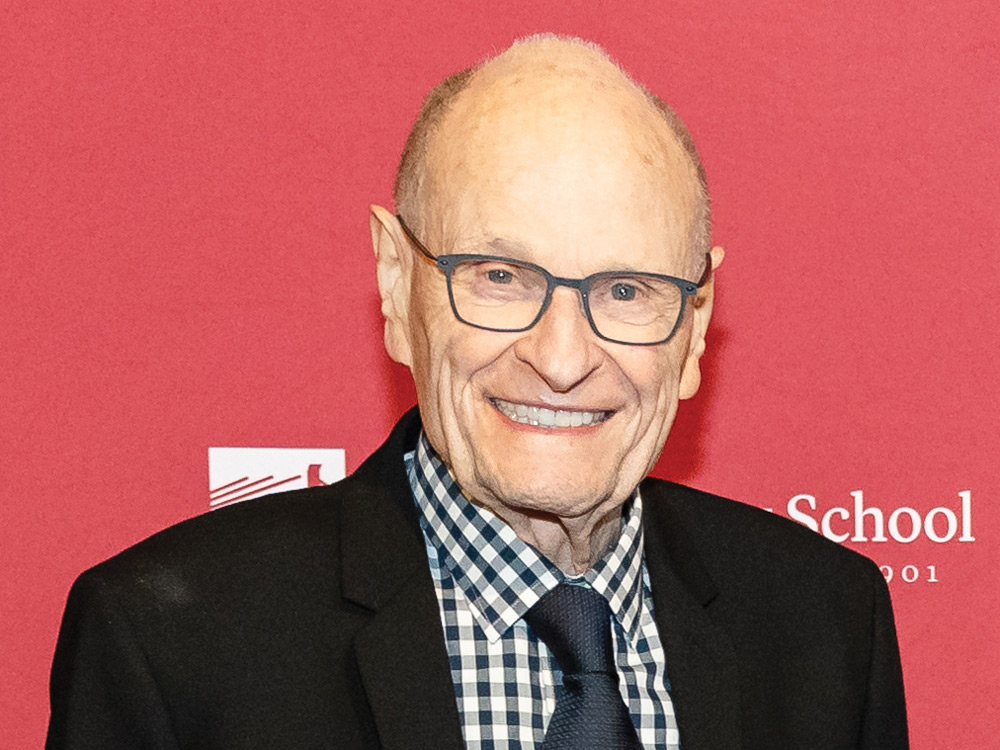
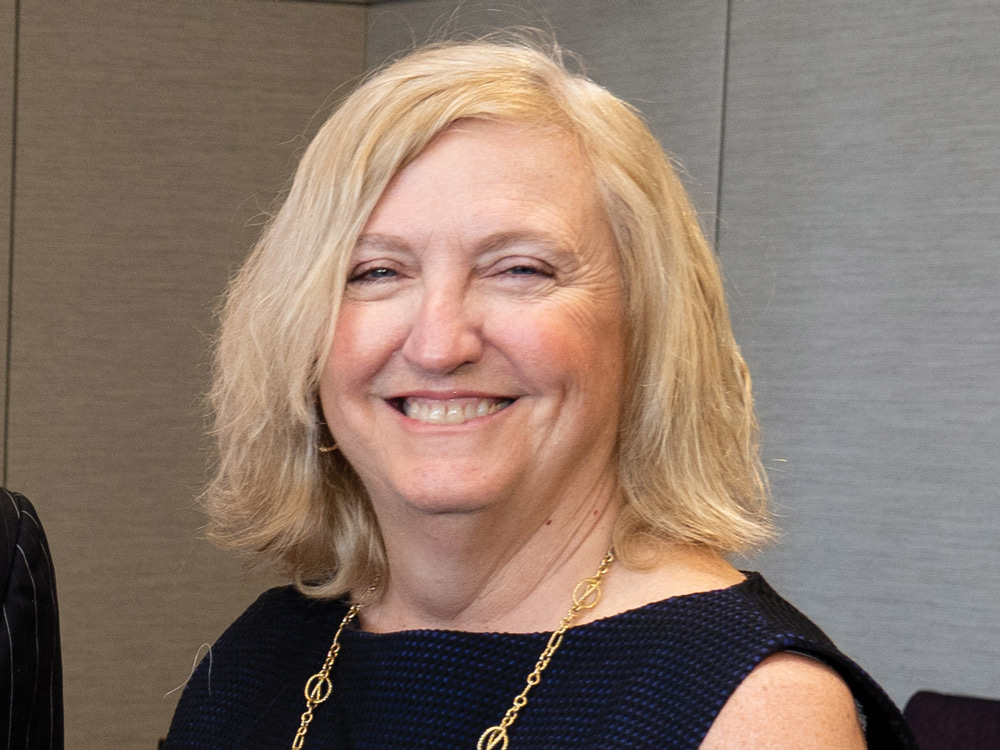
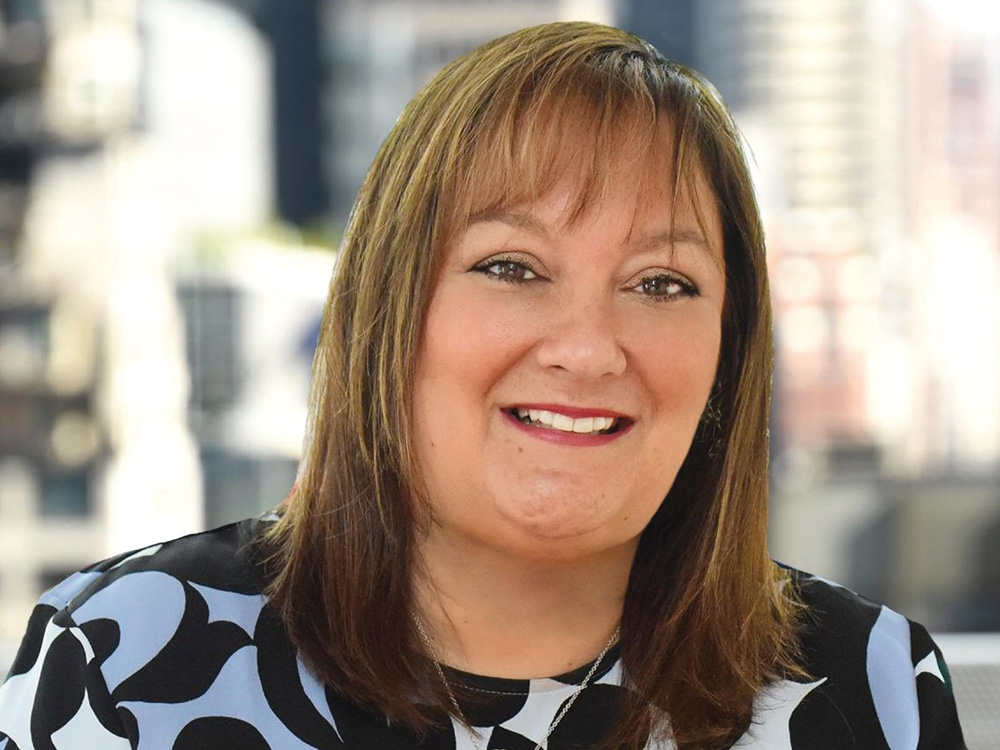
Alumni Come Together to Provide Bar Prep Funding for Students
What many in the school community did not initially realize is that some students have been unable to afford bar prep courses and have missed out on the structured and comprehensive approach to test preparation that such courses provide. When alumni and faculty did learn of the student need, they sprang into action.
Alumni Association President Deborah Riegel ’93, who is also a member of the Board of Trustees, said the issue first surfaced at a trustees meeting in the spring.
Vance Foundation Family Pays It Forward with Scholarship, Fellowship Gifts
The endowed fellowship provides a permanent source of funding for a grant every year to a student who is dedicated to a career in criminal defense. Vance’s parents, who are longtime philanthropists, felt that because they benefited from the Thau family’s generosity, they should pay it forward. They did so by stepping up to help other students pay for their education through a major gift from the Lee and Cynthia Vance Foundation to the Law School.
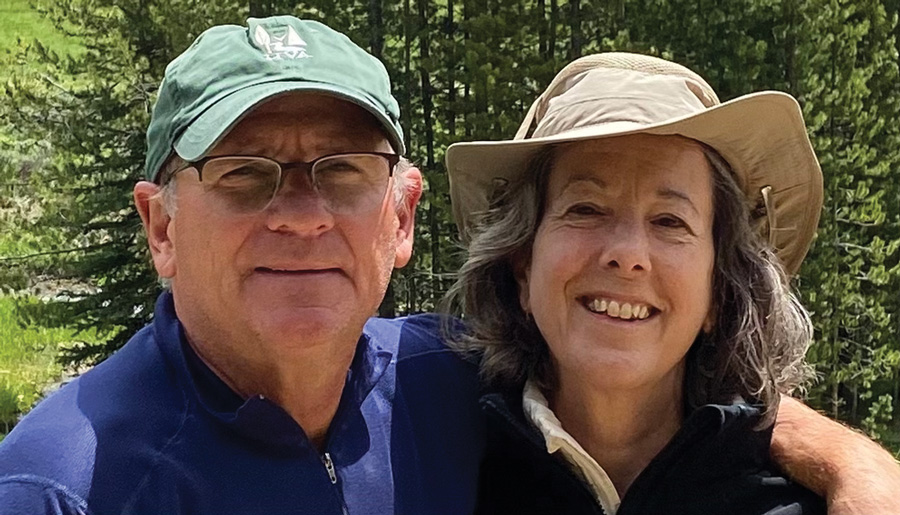
The family set up the Lee and Cynthia Vance Foundation 28 years ago to support educational, social service, public health, public media, and various other causes in New York City that have meaning for them. Cynthia is a vice president of strategic initiatives at Hunter College, and both she and Lee serve on the boards of various nonprofit institutions.
“We tend to support organizations where we also have a really good feeling for the people and the work they’re trying to do, and see ways we can help make that happen,” Vance said.
Through the foundation, they not only made a gift to the Thau fellowship, but also created a new scholarship to help provide funding for Brooklyn Law School students of diverse backgrounds in need of financial assistance.
Giving a hand to those in need is a fitting tribute to Thau, who died on Nov. 10, 2020, at the age of 86, after an extraordinary life and career as a legendary public defender, representing the indigent at the Legal Aid Society and the Federal Defenders of New York.
Clare R. Petti Scholarships Invest in Future Generations of Attorneys
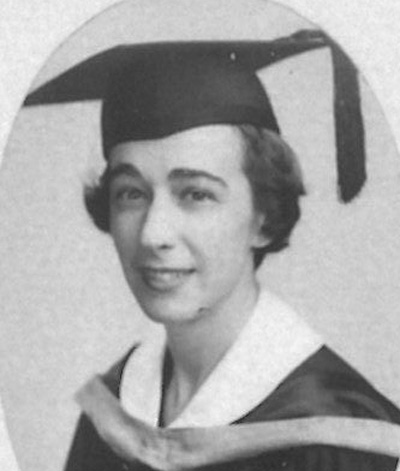
Petti, who passed away in 2007, experienced firsthand the unique challenges that women law students and attorneys faced. A New York City native, she was one of only four women in the Class of 1954. After passing the bar in New York, Petti wanted to practice in her new home state of New Jersey, but the state’s prerequisite of a clerkship, which was then denied to women, initially prevented her from doing so. Yet she persevered in the New Jersey Supreme Court, helping create an alternative to the clerkship, a skills and methods course that opened the door for countless women to practice in the state.
In addition to Petti’s solo practice in Paramus, N.J., which included a great deal of pro bono work, she served on that city’s Board of Education. An advocate for sustainable development, Petti was a strong voice at city council and county government meetings, as well as planning board sessions. She also ran for the Paramus mayoral office in 1986.
The impact of Petti’s legacy—an original endowment of $1.5 million that through investment has increased to more than $2.3 million—is ongoing and evident in the lives and careers of many of the scholarship recipients. Sasha Linney ’11, who received a Petti scholarship in 2009–10, is now managing director and senior counsel for GoldenTree Asset Management and a member of the Brooklyn Law School Board of Trustees. “I was, and still am, extremely grateful for the generosity of Clare Petti,” Linney said. “The scholarship established by her estate was critical for me, as I was funding my own law school education through scholarships and loans. It is Clare Petti’s generosity—and the generosity of so many fellow alums—that inspires me to give back to Brooklyn Law School with my time and money.”
Class of 1975 Couple Pays Tribute to Favorite Professor’s Sayings in Moot Court
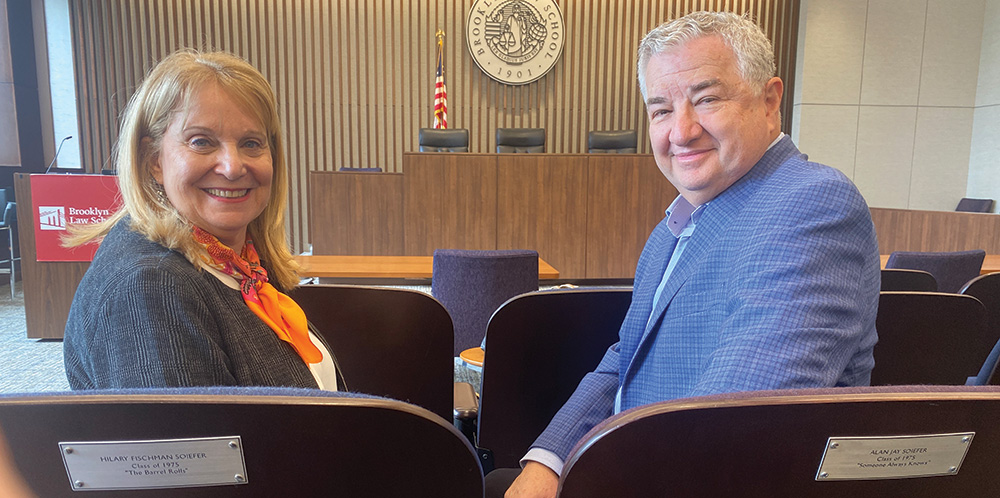
Hilary Fischman Soiefer and Alan Soiefer, both 1975 graduates, decided to have Moot Court seats inscribed with their names and their favorite catchphrases from Joseph Crea ’47, who was their Torts professor.

HILARY FISCHMAN SOIEFER AND ALAN SOIEFER, both 1975 graduates, have a special connection to Brooklyn Law School, because it is where they first met and started dating more than 50 years ago. Now those memories are part of the school itself.
Over the summer, the Soiefers visited the Law School for the first time in years, with a particularly meaningful stop in the Moot Court Room. Although they give to the school annually, they decided to do more this year, and wanted to see firsthand the two chairs they had inscribed with their names to memorialize their favorite catchphrases from Joseph Crea ’47. The legendary professor and scholar, who died in 2019 at the age of 104, taught at Brooklyn Law School for 60 years and was the Soiefers’ first-year Torts professor.
ClassNotes
1969
Jeffrey D. Forchelli, chairman and co-managing partner at Forchelli Deegan Terrana, was selected by his peers for inclusion in the 30th edition of The Best Lawyers in America for land use and zoning law. He has been recognized annually since 2018.
1974
Joseph S. Karp has again been named a Florida Super Lawyer in the field of elder law, an honor he has received every year since 2009. Karp is the founder and principal of the Karp Law Firm, with offices in Palm Beach Gardens, Boynton Beach, and Port St. Lucie, Florida.
In Memoriam
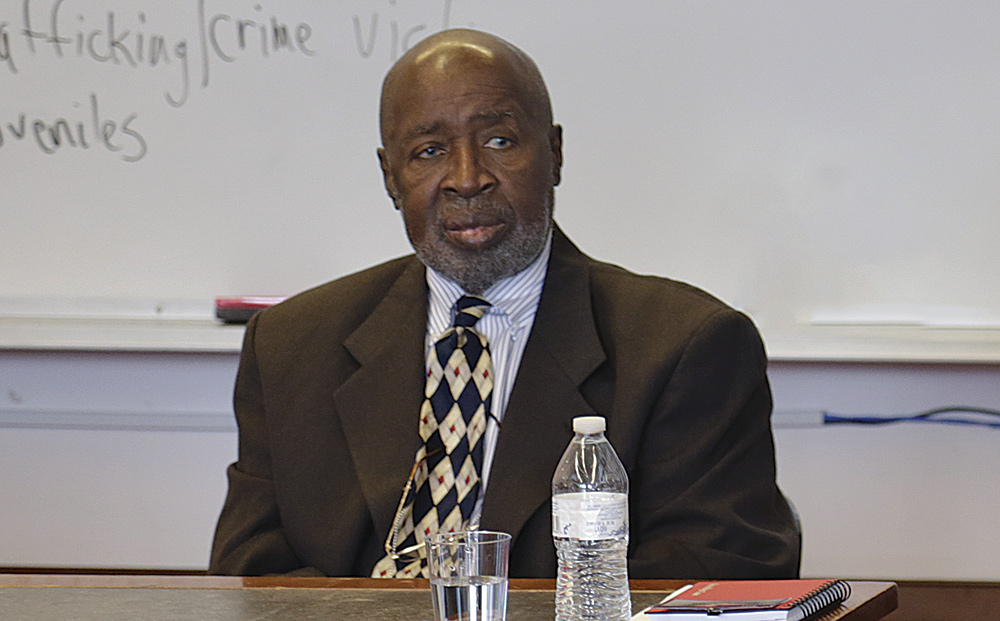
Hon. Sterling Johnson Jr. ’66
Hon. Sterling Johnson Jr. ’66, a senior judge of the U.S. District Court for the Eastern District of New York, passed away on Oct. 10, 2022 in Queens, N.Y. He was 88.
Johnson entered Brooklyn Law School in 1963, while he was an officer with the New York City Police Department, switching to night police work so that he could attend classes at Brooklyn Law School during the day, according to The New York Times.
He later gave his time to the Law School, serving as one of 22 federal judges from the U.S. District Court for the Eastern District of New York who took part in the school’s EDNY Day in 2019. He taught refugee law.
During Johnson’s time as a federal judge, the Times noted, he was best known for ordering the closing of a Guantanamo Bay detention facility, which he referred to as an “HIV prison camp” for Haitian refugees, and for ruling that New York City had failed to adequately help poor residents who had AIDS.

Closing


The Future of Civil Liberties
Why did you write your latest book and what do you hope readers will take away from it?
I wrote this book because I wanted to share what I learned from spending over three decades on the American Civil Liberties Union (ACLU) Board of Directors, including 12 years as president, and four decades teaching about the U.S. Constitution.
I hope that readers will take away an appreciation for how civil liberties came to be recognized in the U.S. during the 20th century and how it has come to pass that we are now losing so much of what our predecessors struggled to win. The opening line of the book is a quote from the ACLU’s first executive director, Roger Baldwin, who frequently remarked that no civil liberties battle ever remains won. I would like readers to see the history of civil liberties as involving pendulum swings, and to engage with the question of how we can get the pendulum to swing back in the direction of liberty and equality.
